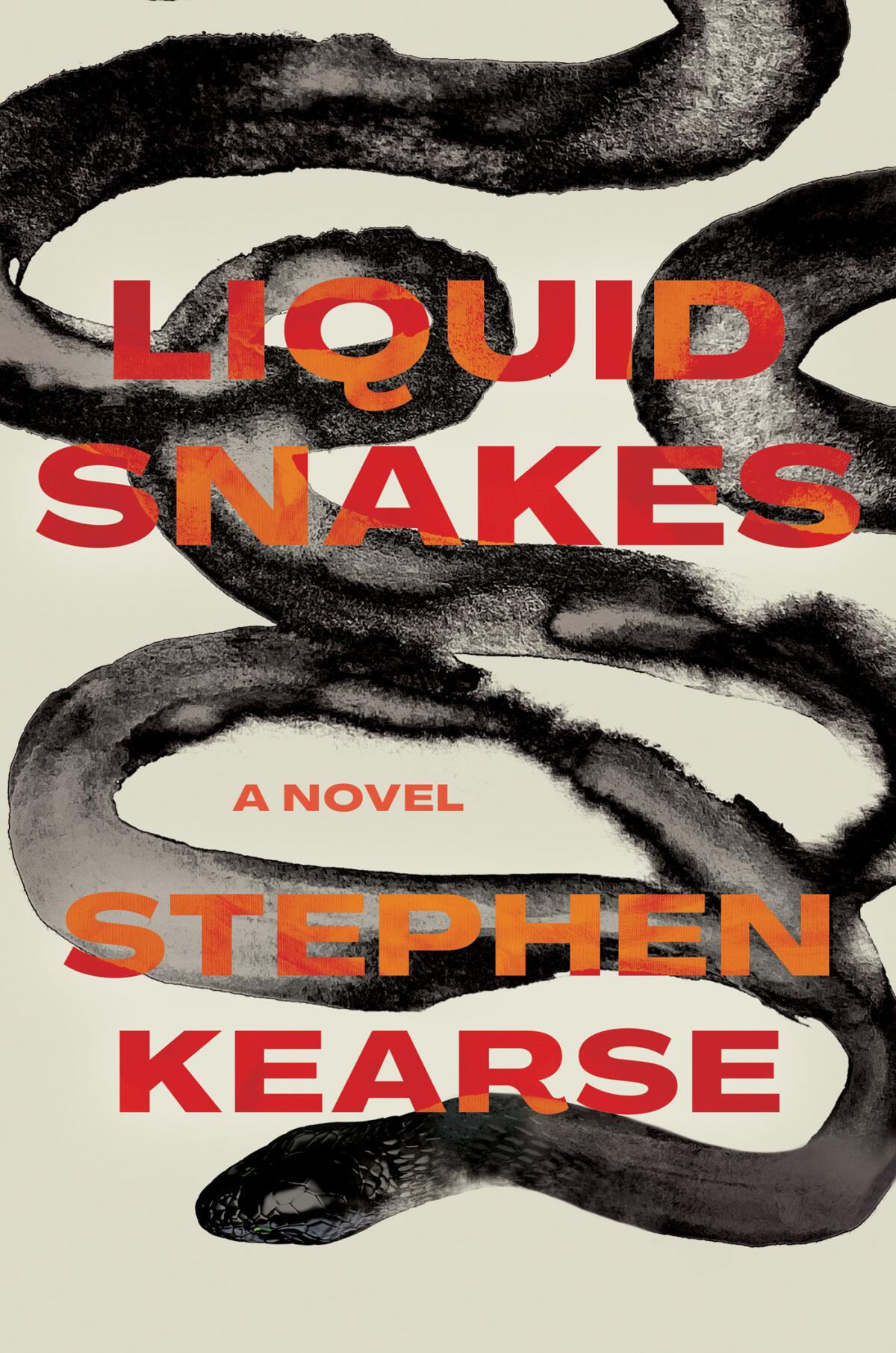A fun but bleak new Black sci-fi novel tests the limits of Afro-pessimism

- Share via
Review
Liquid Snakes
By Stephen Kearse
Soft Skull: 320 pages, $27
If you buy books linked on our site, The Times may earn a commission from Bookshop.org, whose fees support independent bookstores.
“Liquid Snakes,” Stephen Kearse’s sophomore novel, is a brisk, punchy read. The chapters are short, the dialogue has a satirical snap and the plot is a mix of heist, mystery, science fiction and crime. But the genre pleasures are deceptive; the coils of narrative may be fun to unwind, but the poison stings — and worse than stings. This is a book rooted less in pulp than in Afro-pessimism. You follow its curving paths, and just when you think you’re free of the maze, you find yourself staring into America’s dead, lidless eyes.
The book is centered in Atlanta, among a new aspiring class of Black professionals and would-be professionals. But instead of post-racial hope, the city is facing a new kind of racist violence. Promising Black youths are taking something that dissolves them and their surroundings, leaving behind a sinkhole that looks like a “shimmering sea of blackness.” Ebonee and Retta, agents of the Epidemic Intelligence Service, aren’t sure whether it’s a drug or an explosive. But they connect it quickly to a chatbot app called Eightball, which seems to encourage its users to pursue self-destruction.
Victor LaValle’s novel ‘Lone Women’ reinvents the western, adding horror and a Black woman pioneer protagonist — with help from the women in his own life.
Some spoilers follow for the early part of the book, although they are easy to deduce and essential to describing Kearse’s project.
The person behind both Eightball and the deadly poison/bomb is Kenny, an independent coffee-shop owner with a signature blend called “Black Sublime.” At least, that’s what he is during office hours. The rest of the time he’s a brilliant rogue supervillain chemist.

Kenny’s daughter, Saskia, was stillborn after his wife, Maddy, was exposed to the environmental poisons the company Kingman dumped into Black neighborhoods. Kenny’s grief and rage settled in for good. His marriage disintegrated, and he began developing RST, a compound that could disintegrate everything else. He then made it available to kids he found through his Eightball app. Responding to the chemically induced death of his daughter by bringing chemically induced death to other Black children seems perverse. Kenny, though, sees it as a kind of mercy: “What reasonable person wouldn’t choose death when black life was so pernicious...?”
That’s a grim sentiment, and the novel pursues it remorselessly. Kenny is the only real suspect, and his culpability is nailed down fairly early. The point of the book isn’t to solve the case or bring Kenny to justice, but to systematically reveal the paralyzing sinkhole of injustice that dissolves all hope and all strategies of resistance into a flat, unreflective goo.
L.A.s 13 most essential works of speculative fiction, from Octavia Butler, Philip K. Dick, Aldous Huxley, Salvador Plascencia and many more.
Affluence and respectability are no shield against environmental racism and police profiling; Kenny is late to one appointment because cops stop him three times, knowing only that he’s Black. In response to such biases, some Black people, like Kenny’s partner, Thurgood, who “lived to protect his bread and to preserve it,” hope to find salvation in capitalism. Others, like Kenny’s baseball-star nephew Maurice, turn to physical excellence and the hope of meritocracy. Retta devotes her life to do-gooding, fighting the everyday killers — “diabetes, obesity ... maternal deaths, alcoholism.” And Kenny himself turns to terrorism and revenge, plotting the horrific obliteration of Kingman’s corporate board.
Every one of these approaches, Kearse suggests, is a dead end in more than one sense. Thurgood is destined to find “that at a certain altitude, virility went moot”; Blackness and patriarchy simply can’t function together. Maurice has to prove himself worthy through baseball, which makes it a trap rather than an escape; he hates the game and, by extension, the player who depends on it — himself. Retta’s old-school commitments are no match for the new scourge of RST. And Kenny’s vendetta is even more useless. “[T]hese aren’t people in the business of feedback, even among themselves,” Maddy tells him. “You could kill the whole board of directors and they’d just hire a new board.”
Toward the end of the novel, Retta asks, “So you’re saying we, our people, are a crime scene?” What’s left after RST is unleashed is a symbol of what has been done, is still being done, to Retta and Kenny and their kin. The United States reduces Black people to a toxic crater — a nightmare absence.
“The function of black(ness) is to give form to a terrifying formlessness,” Afro-pessimist philosopher Calvin Warren has written. Freedom and existence for white people, Warren argues, depend on Black unfreedom and unbeing. By making Black people into a sinkhole, white people assure themselves they haven’t been swallowed up.
Jeff VanderMeer is reissuing his debut novel, which launched a subgenre of sci-fi. ‘Veniss Underground’ shows how much the author has evolved since then
In this context, Kenny’s RST could be seen as a kind of reclamation of nihilism; he’s seizing and wielding Black nothingness just as some hip-hop stars have embraced and reclaimed violent Black stereotypes. Dissolving Black kids into puddles of goo, though, isn’t much of a victory. The liquid snake that swallows itself, the novel that ends in a bloom of death and irony, doesn’t leave behind much to work with.
Kearse does offer an elliptical path to freedom; he ends with one young girl realizing “she didn’t have to look into the abyss to see her way through it, out of it.” After all the abysses we’ve looked into over the course of the book, that’s not much of a blueprint for optimism. But writers don’t owe readers hope, and Black people certainly aren’t obligated to reassure the U.S. that all will be well when all evidence suggests it won’t.
“Liquid Snakes” is a strange, disorienting puzzle; a mocking eulogy; a bitter, self-lacerating exercise in what one character calls “vivid ideation”; a long look into a sinkhole of grief. It twists in your hands and in your heart before biting down.
Berlatsky is a freelance writer in Chicago.
More to Read
Sign up for our Book Club newsletter
Get the latest news, events and more from the Los Angeles Times Book Club, and help us get L.A. reading and talking.
You may occasionally receive promotional content from the Los Angeles Times.









